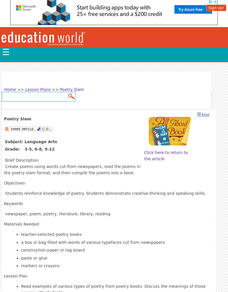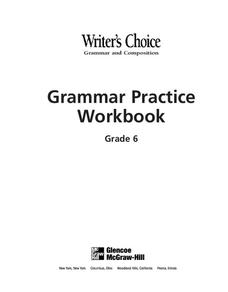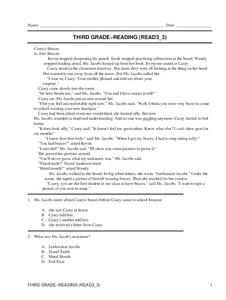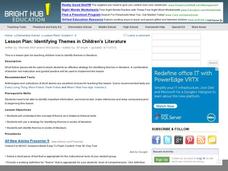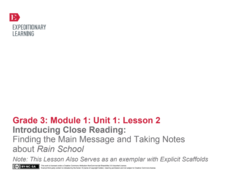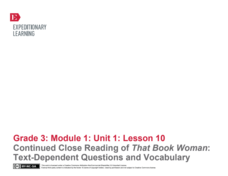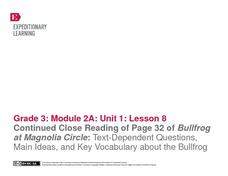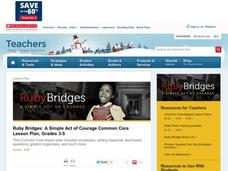Curated OER
Poetry Slam!
Create poems without writing! Young poets create poems using words cut from newspapers, read their poems aloud, and compile them in a book. This lesson allows the teacher to view each learner's creative process and assess their current...
McGraw Hill
Grammar Practice Workbook
To an English teacher, the only sound worse than nails on a chalkboard is a student using improper grammar. Make poor grammar a problem of the past with this extensive collection of worksheets that covers everything from sentence...
Reed Novel Studies
Third Grade Angels: Novel Study
A million things to do, a ton of homework ... hyperbole sure does help get the point across! With the novel study for Jerry Spinelli's Third Grade Angels, scholars practice writing their own exaggerated sentences. Additionally, they...
Curated OER
The Sound of…Poetry!
Scritch, scratch, scritch. It's the sound of pupils writing poetry! Focus on sensory language and onomatopoeia with a writing lesson. After listening to some sounds, learners examine a couple of poems that include sound words and then...
Curated OER
The Land Around Us - Lesson 3
While the content of this lesson is more specific to the first grade, the directions given to work on a PowerPoint are well written. These directions could be used by anyone, with any content. Younger learners may need help reading the...
Curated OER
Third Grade Reading
In this reading worksheet, 3rd graders answer multiple choice questions by reading 3/4 page passages and answering comprehension questions. Students complete 25 questions.
Curated OER
Identifying Themes in Children's Literature
Identifying themes in literature is the focus of the language arts lesson plan presented here. Learners read short pieces of fiction and practice the skill of identifying the themes present in each one. The bulk of the lesson consists of...
Curated OER
Fairytales for 4th Grade
Students read different versions of the Three Little Pigs and then hold a trial for the Wolf. They create a Venn diagram to show the likenesses and differences and engage in a poster making activity to advertise the books.
Curated OER
It's Raining Cats and Dogs! Literary Devices and Figurative Language
Third and fourth graders study literary devices and figurative language. They view a PowerPoint presentation (which you must create) to review hyperbole, idiom, simile, and metaphor. They read and discuss the book There's A Frog in My...
EngageNY
Mid-Unit 2 Assessment: On-Demand Informational Writing
Lesson 7 focuses on building academic vocabulary and writing an explanatory letter with supported textual evidence. For the first five minutes of the instructional activity, the educator reminds the class of how to read and refer to the...
EngageNY
Close Reading of That Book Woman: How Did People Access Books in Rural Areas of the United States?
For this ninth lesson plan in a larger beginning-of-the-year unit, close reading skills are used independently to find the gist of the story That Book Woman. Rereading for important details is the targeted skill to unlock a deeper...
EngageNY
Continued Close Reading of Bullfrog at Magnolia Circle: Text-Dependent Questions and Vivid Words and Phrases
As 3rd graders continue reading Bullfrog at Magnolia Circle, they focus on the concepts of predator and prey in the fifth lesson plan of this unit. Scholars further develop their ability to answer questions using evidence from the text...
EngageNY
Continued Close Reading of Bullfrog at Magnolia Circle: Text-Dependent Questions and Vivid Words and Phrases
In the third activity from this unit based on the book Bullfrog at Magnolia Circle, learners focus on using specific details from the text-to-answer questions about the habitat of bullfrogs. While reading the text, young scholars are...
EngageNY
Introducing Close Reading: Finding the Main Message and Taking Notes About Rain School
This second lesson in a larger unit is perfect for the beginning of the year because it explicitly teaches 3rd graders how to use close reading skills by identifying unfamiliar words, figuring out the gist, and defining important...
EngageNY
Continued Close Reading of That Book Woman: Text-Dependent Questions and Vocabulary
Explicitly explained and delightfully detailed are two ways to describe this tenth lesson plan in a larger unit designed for the first few weeks of third grade. Learners continue to use and develop previously learned close reading...
EngageNY
Close Reading of Bullfrog at Magnolia Circle: Text-Dependent Questions, Main Ideas, and Key Vocabulary about the Bullfrog
As your 3rd grade class finishes reading Bullfrog at Magnolia Circle, the eighth lesson plan of this unit helps readers from an understanding of the very specific information on the final page of the book. As with the entire unit,...
EngageNY
Developing Reading Fluency: Criteria for Reading Aloud
Third graders develop their reading superpowers in a lesson plan on fluency. After first listening to an audio recording or teacher read aloud, the class works together identifying criteria for fluent reading, focusing on phrasing, rate,...
Curated OER
Character Traits in Fables
Combining art, music, dance, and reading comprehension, this lesson is geared to reach all ability levels. After reading a variety of fables and discussing story elements and character traits, class members select a moral to use as the...
Curated OER
Story Summaries; The Three Little Pigs
Students explore language arts by completing a graphic organizer in class. In this story structure instructional activity, students read the classic tale "The Three Little Pigs" and discuss the main characters, conflict and setting....
Curated OER
What Is the True Story of the Three Little Pigs?
Cozy up and listen to a recording of The True Story of the Three Little Pigs and The Three Little Javelinas. Then, lead your class in a compare and contrast of the two stories by creating a Venn diagram.
Curated OER
Gender of Nouns: Grade 3
Translate noun gender with this flashy grammar activity! Class members classify a list of nouns according to gender, provide corresponding opposites of gendered nouns provided in analogies, and complete short word puzzles with common...
Scholastic
Ruby Bridges: A Simple Act of Courage, Grades 3-5
Through character trait graphic organizers, a vocabulary sorting activity, class discussion, and a civil rights movement slide show, your young historians will be introduced to the amazing story of Ruby Bridges and her experiences as the...
K12 Reader
World Climates
Why is weather different around the world? Learn about world climates with a reading comprehension passage. Kids read a short passage before answering five comprehension questions based on context clues.
Curated OER
Language Arts: Twinning At-Risk Students
Students at-risk in high school and primary grades pair up to read and write together. They create books modeled after authors and illustrators. They hold a parents' day to display their completed books.


